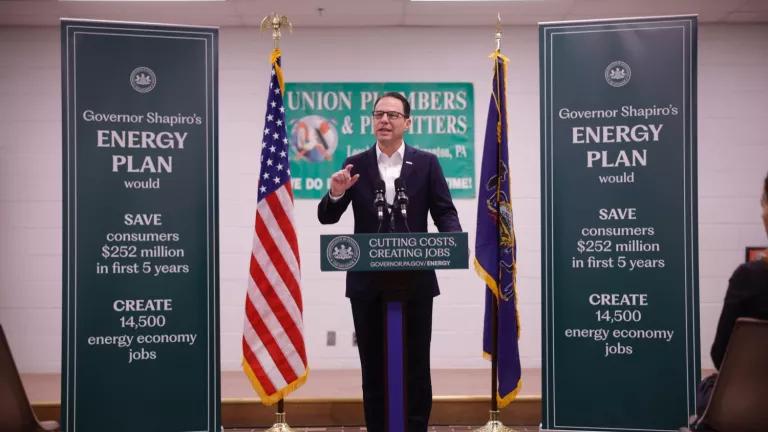Communities' Right to Determine Their Own Fracking Future: NRDC Files Brief on Behalf of PA Communities to Defend Zoning Powers
Today, NRDC filed an amicus, or “friend of the court,” brief with the Pennsylvania Supreme Court on behalf of seven communities—Bell Acres, Bethlehem, East Finley, Monroeville, Murrysville, Tinicum, and Wilkins—to defend their right to use local zoning laws to determine whether and/or how fracking moves forward within in their borders. The brief was filed in support of the Commonwealth Court decision declaring the zoning provisions of Pennsylvania Law Act 13 unconstitutional.
As I blogged about previously, Act 13, if it had taken full effect, would have permitted fracking virtually everywhere in the Commonwealth—even close to homes, schools, and hospitals—without any regard to community character or the existing local economy. While not all of the communities represented today by NRDC have the same popular opinions on gas drilling, they all agree that when it comes to locating a heavy industrial activity like fracking, they must have the right to make decisions about where it takes place within their borders in order to protect their valuable individual character and development goals.
For those interested, a copy of the brief is available here, but for those who want the Cliff’s Notes version, here it is:
- Community Character Matters—All people are influenced by the character of the community in which they live. Often described as a place’s “personality,” community character is the combination of physical and human inputs that contributes to the “feel” of area, and it has powerful and measurable effects on community identity, health, happiness, and economic success.
- Fracking Is a Heavy Industrial Activity that Could Affect the Community Character of Pennsylvania’s Diverse Communities—Like any industrial activity, certain negative impacts with fracking are simply unavoidable: thousands of heavy truck trips are necessary to carry the water, chemicals, and equipment to the site; air emissions are released from well sites and impoundment ponds; considerable areas of land must be cleared for well pads, pipelines, and compressor stations; and the drilling and fracking processes themselves are noisy and require nighttime illumination. Bringing this activity to Pennsylvania communities incompatible with drilling—particularly rural, agricultural, or residential communities—could affect home prices or interfere with existing important local economic engines such as tourism or farming. On a personal level, some families have invested in living in a peaceful rural community simply do not want to live in an area with fracking.
- Communities Must Be Able to Protect Themselves Through Zoning and Comprehensive Planning Decisions – About a hundred years ago, people recognized that allowing all types of development everywhere (such as allowing smoke-belching factories in places where people lived), just didn’t make a lot of sense. That’s why they created zoning—a plan for organizing land uses within a community so that they don’t harm one another, and overseen by the governing body that understands the community most closely (i.e. the city, township, or borough itself). This system, which encourages thoughtful and long-term land use planning, is the standard in Pennsylvania, and vital to protecting its communities from threats to their character and development goals.
- Act 13 Deprives Communities of Vital Zoning Authority Over Fracking—Act 13 contemplates allowing fracking, and many of its associated industrial activities, as-of-right in nearly all zoning districts in Pennsylvania. This not only leaves communities powerless to protect the health, happiness, livelihood, and democratic preferences of its citizens, it also sets a bad precedent for similar treatment of other industrial activities.
In short, all communities should be entitled to land use planning that is protective of community character and that employs a little common-sense. And allowing an industrial activity everywhere—whether it’s a gas well, a coal mine, or a chemical plant—just doesn’t make any sense.
This simple fact was not only recognized by the Commonwealth Court, but also by an ever growing number of people in Pennsylvania. In addition to the 60+ communities who formally support the challenge to Act 13, the communities who successfully challenged Act 13 will be helped by amicus support from the Pennsylvania Chapter of the American Planning Association, the City Council of Pittsburgh, a collection of Pennsylvania non-profits, the Pennsylvania State Association of Boroughs (representing over 900 Pennsylvania boroughs), and the Pennsylvania Association of Township Supervisors (an organization representing elected officials in over 1,400 Pennsylvania townships).
The brief NRDC is filing today comes as part of our ongoing work to assist and defend communities dealing with local issues related to gas drilling. NRDC is happy to lend its support on behalf of the growing number of communities fighting for their right to zone potentially dangerous industrial activities that could affect their communities, and will continue to do so well after the Pennsylvania Supreme Court renders its opinion.




